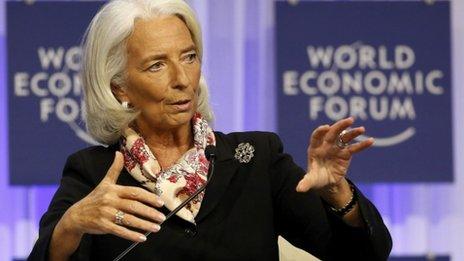Davos 2014: Eurozone inflation 'way below target'
- Published

Christine Lagarde was speaking on Saturday, the final day of the World Economic Forum
The head of the International Monetary Fund (IMF) has warned that deflation remains a real risk to economic recovery in the eurozone.
Despite signs of recovery across the world, Christine Lagarde said that potential risks must not be ignored.
One of these was the fact that eurozone inflation, at 0.8%, remained "way below" the 2% target set by the European Central Bank (ECB).
She was speaking on the final day of the World Economic Forum, in Davos.
Deflation can hinder growth, as prices and the value assets continue to fall.
Ms Lagarde told a Davos debate on the global economic outlook, that - despite signs of recovery everywhere, there were "old risks" and "new risks".
Old risks included any failure to continue banking reforms and re-balance economies, she said.
New risks were, how emerging economies responded to the winding down of economic stimulus measures in the US, and the problems facing economies whose inflation rate remained stubbornly below target.
Mario Draghi, president of the ECB, told the same conference that the bank was ready to act if necessary, but he insisted that deflation was not yet an issue for the eurozone.
He said eurozone inflation is "subdued, and expected to remain subdued" for about two years. "The longer it stays at a low level, the more serious risk of deflation," he said.
'Completely changed'
But he said the fall in inflation was primarily due to slowdowns in four heavily-indebted countries: Greece, Spain, Ireland and Portugal.
These countries were now seeing much better economic growth, which is why eurozone inflation would likely return to target in the medium term, Mr Draghi said.
In Japan, prolonged deflation stunted economic growth for years. But government stimulus measures - so-called Abenomics - appear to be breathing new life into the world's third-largest largest economy.
The Bank of Japan's chief, Haruhiko Kuroda, told the conference that the country's inflation rate should reach its 2% target within two years.
"Now the situation has completely changed, and I'm quite optimistic as far as economic growth and appropriate 2% inflation are concerned," Mr Kuroda said.
"They will be achieved, but we are only half way. There's still a long way to go. We have to be mindful that there could be downside risks or upside risks from inside the country or abroad."